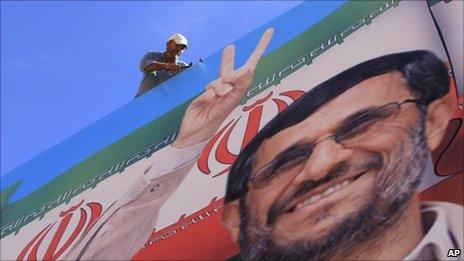Ahmadinejad in Lebanon: Domestic and regional tensions
- Published

Lebanon prepares a warm welcome for Mahmoud Ahmadinejad
The highway that runs from the airport to the centre of Beirut has been decorated with Iranian flags and posters welcoming President Mahmoud Ahmadinejad. So have the roads that go south, which he will take when he visits villages on the Israeli border.
Mr Ahmadinejad has been invited by the Lebanese head of state, Michel Suleiman.
But his meetings with the head of Hezbollah, his fellow Shia Hassan Nasrallah, will be more important.
Hezbollah is a Shia Muslim religious, political and social movement, as well as Lebanon's most powerful armed group and an implacable enemy of Israel.
For some in this part of the world, especially the poor and religious, MrAhmadinejad and Mr Nasrallah have become something like political rock stars.
What has made them that, above all, is their hostility to Israel.
Mr Ahmadinejad will be a welcome guest in Shia areas of Lebanon. Iran paid for much of the reconstruction that was necessary after the war with Israel in 2006.
The money, starting out with a bundle of US dollars for everyone whose house had been destroyed, was channelled through Hezbollah.
But as ever in Lebanon, where power is split between the religious communities, one person's hero is another's nightmare.
Samir Geagea, the leader of the Christian Lebanese Forces party, and a strong opponent of Hezbollah, told the 大象传媒 that Mr Ahmadinejad would be welcome if he behaved like the president of Iran, but not "if he behaves like president of part of Lebanon".
'Pawns in a game'
Visits of foreign dignitaries can be an unpleasant reminder of Lebanon's place in the Middle East.
The problem is not that the offers of help and support they bring with them have strings attached. That is the way international politics works.
Ahmadinejad's visit close to the Israeli border will be closely watched
It is more that big and powerful guests can make some Lebanese feel that they are pawns in a game they cannot control, or even influence all that much.
Not even the biggest and strongest can ignore other countries. Look at the way the United States has been weakened by its involvement in the Middle East in the last 20 years.
But Lebanon's fate is deeply connected to the big issues of war and peace that bubble away constantly in this part of the world. They go to the heart of the country, and have a direct impact on its stability.
Shadow of assassinations
Sectarian and political tensions rose steadily throughout the summer in Beirut.
The reason this time is the UN's special tribunal for Lebanon, which was set up in 2005 to investigate the assassination of former Prime Minister Rafik Hariri and the wave of political killings that followed.
The tribunal is believed to be close to issuing indictments, including ones naming members of Hezbollah.
Mr Nasrallah has moved pre-emptively to condemn the tribunal as an Israeli project, and to call for the Lebanese government to cut ties with it.
The current Lebanese prime minister is Rafik Hariri's son, Saad. He is under unrelenting pressure from Hezbollah and Syria to denounce the tribunal that was set up to investigate his father's assassination.
The arrival in Lebanon of the leader of Hezbollah's other patron, Iran, is only going to increase the pressure on him, and to raise the political temperature here even further.
Mr Ahmadinejad's plan to visit the border area with Israel is going to demonstrate, once again, how Lebanon is tied in to the big trends in the Middle East.
No issue is bigger at the moment than the stand-off between Iran and much of the rest of the world over its nuclear programme.
The Iranians deny Israeli and Western allegations that they are trying to build a nuclear bomb. One possibility is that Israel will attack Iran's nuclear facilities.
Mr Ahmadinejad is going to engage in some political signalling when he is in the south, perhaps close enough to Israel sto see cars moving on roads on its side of the border wire.
First he will be reminding Israelis that in Hezbollah he has a strong ally close to them.
And he will be trying to show his supporters - and his critics - back home that Iran is not as isolated as it seems.
- Published22 September 2010
- Published25 May 2010
- Published15 March 2016
- Published31 July 2010
- Published4 August 2010